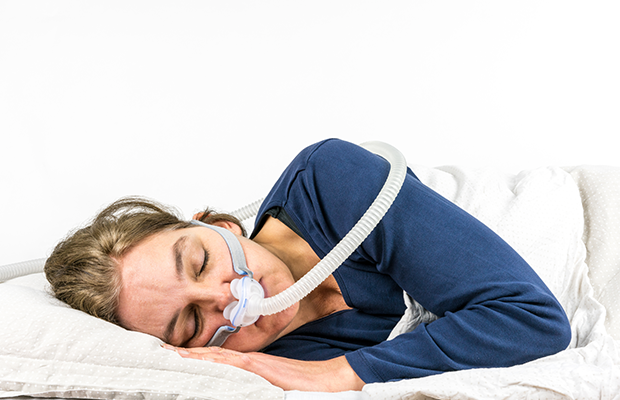
Can sleep apnoea cause heart problems?
“Is sleep apnoea linked to heart problems and what can be done to treat it?” Professor John Stradling, Emeritus Professor of Respiratory Medicine, with a specialism in sleep apnoea, at the University of Oxford, answers your questions.


“Is sleep apnoea linked to heart problems and what can be done to treat it?”
Professor John Stradling, Emeritus Professor of Respiratory Medicine, with a specialism in sleep apnoea, at the University of Oxford, answers your questions.
What is sleep apnoea?
Obstructive sleep apnoea (OSA) is a common condition where your breathing repeatedly stops and starts while you sleep.
This usually happens because the muscles in your throat relax too much, blocking your upper airway. As your breathing is interrupted, you partially wake up. Some people with really severe sleep apnoea can wake every minute through the night. Usually, people don’t wake up enough each time to realise that they’ve woken up, but in the morning they feel very sleepy and tired.Want to get fit and healthy?
Sign up to our fortnightly Heart Matters newsletter to receive healthy recipes, new activity ideas, and expert tips for managing your health. Joining is free and takes two minutes.
I’d like to sign upHow do I know if I have sleep apnoea?
If you (or your partner) notice that during your sleep your breathing is repeatedly interrupted, you are making choking noises or snoring loudly, and you are feeling very sleepy in the day, these could be signs of sleep apnoea. A larger neck (a collar size that’s 17 inches/ 43cm or more), carrying excess weight, or hormonal conditions including an underactive thyroid can put you at more risk of sleep apnoea.
Is sleep apnoea dangerous?
When you have sleep apnoea episodes, you may experience temporary drops in oxygen levels, big surges in “fight or flight” hormones (such as adrenaline), sudden changes in your blood pressure, and heart rate rises as your body struggles to breathe.
Can sleep apnoea affect the heart?
Sleep apnoea’s connection with the heart is complicated. Some studies have shown an association between sleep apnoea and increased risk of heart attacks and death from cardiovascular causes. An association alone doesn’t prove that sleep apnoea actually causes cardiovascular problems, and sleep apnoea and cardiovascular problems have some shared risk factors, such as overweight and obesity. At the moment it hasn’t been shown that treatment for sleep apnoea reduces cardiovascular problems.
There is also evidence that sleep apnoea can increase blood pressure in some people. If you have atrial fibrillation (AF, an irregular heart rhythm problem), sleep apnoea can trigger episodes of AF.Treating sleep apnoea can bring down high blood pressure, but it is not as effective as blood pressure medication.
Treating sleep apnoea can bring down high blood pressure, but it is not as effective as blood pressure medication.
So, in general, get sleep apnoea treated if it is causing symptoms (usually sleepiness) sufficient to affect your quality of life, not for any benefits to your heart health. If you are concerned about your heart health, talk to your GP.
How to treat sleep apnoea
There are some simple things that can help with sleep apnoea. If you are carrying excess weight, losing weight is likely to help. Sleeping on your side can help. You can buy devices to encourage you to sleep on your side; unfortunately, the old remedy of attaching a tennis ball or similar object to the back of your pyjamas is not very effective. Some people sleep with mandibular advancement devices – these mouthguard-like devices hold your jaw slightly forward, which can help keep your upper airway more open.
- Visit our nutrition section for ideas on healthier eating
- Discover 5 steps to sustainable weight loss
What is a CPAP machine?

If you have very severe sleep apnoea, the best treatment is a continuous positive airway pressure (CPAP) machine (pictured). With this, you wear a mask over your nose, or your nose and mouth, which gently pressurizes the upper airway to hold it open. You will probably need to use it almost every night but the improvement in symptoms can be dramatic (as well as stopping the snoring!). This treatment is available on the NHS and is remarkably effective; it is used by over 100,000 people in the UK.
If you think you might have sleep apnoea and could benefit from using a CPAP machine, talk to your GP, who can refer you to a sleep clinic. For more information about sleep apnoea and its treatments, see the Sleep Apnoea Trust’s website.
What to read next...
Top 10 tips for a good night's sleep


